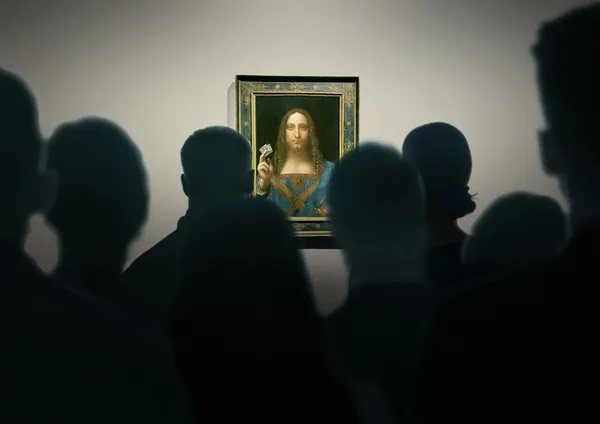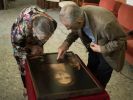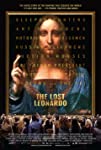Eye For Film >> Movies >> The Lost Leonardo (2021) Film Review
The Lost Leonardo
Reviewed by: Amber Wilkinson

It's been a good few weeks for fans of documentaries that play out like mystery thrillers, with this art world dive from Dutch filmmaker Andreas Koefoed following hot on the heels of Sam Hobkinson's Misha And The Wolves. Hobkinson's film concerned the murky provenance of a person, and this time around its the history of an artwork that is the jumping off point for a much wider consideration of the art industry in general.
Initially, keen telly watchers may notice similar elements to those that play out in Fiona Bruce's BBC1 show Fake or Fortune, which sees art owners learn the truth about their prized possessions. Through the course of this film - which charts the extraordinary recent history of Renaissance painting Salvator Mundi - Koefoed also keeps one eye on the way that love of money drives proceedings as much as love of the art in question.

Right from the credits, Koefoed clues us in as to where his film's trajectory will take us, showing in graph form how the Salvator Mundi was bought for less than $2,000 in 2005 and whose price, thanks to suggestions it might have been made by Leonardo Da Vinci, has simply skyrocketed since (the last time it was up for auction, in 2017, it sold for $450million).
Separated into three parts - The Art Game, The Money Game and The Global Game - Koefoed's first-person approach makes it absorbing from the off, as the main players involved with the painting, from the original buyer, to critics and dealers through to curators and the woman who restored it, Dianne Modestini, all relate their part in its progress as they remember it. Koefoed shows how a lot of this is, as one man puts it, less to do with cultural value and more to do with "economics and greed", while another, on considering how works like this can be used to generate political influence, notes, "Power is never neutral".
And so we see how, by baby steps, question marks about whether or not it was a true Da Vinci began to be eroded, rightly or wrongly, not least because the economic drivers for buying and selling art mean that everyone has a vested interest in a piece being worth more money rather than less. Koefoed keeps things tense, re-enacting moments to break the talking heads and there's strong editing, so that if someone is referenced we often get a quick glimpse of them, so we can keep a handle on all the players. There's a dance going on between kudos and cash, as the painting first becomes a pawn in the gallery game before being 'flipped' for cash on its way to an oligarch. Koefoed isn't scared to treat his interviews as hostile witnesses on occasion, so that the film always seems to be on the side of the artwork rather than any individual. Modestini, who lovingly restored the painting and who has faced attacks as a result, meanwhile, becomes a sort of melancholic emotional touchstone, seeming to be one of the few people here who genuinely cares about the painting as an object of art as opposed to an asset.
As intrigue piles upon intrigue, there's also an immense amount of fascinating stuff about the nature of freeports - some may remember Christopher Nolan's Tenet glanced on the shady nature of them - and here Koefoed clearly shows the way in which art is often squirrelled away in these tax havens, not for beauty or safety's sake, but simply to be used as collateral against loans taken back 'in the real world'. It may be true, as one interviewee puts it, that "opinions matter more than facts", but it seems that money matters most of all.
Reviewed on: 10 Sep 2021

















